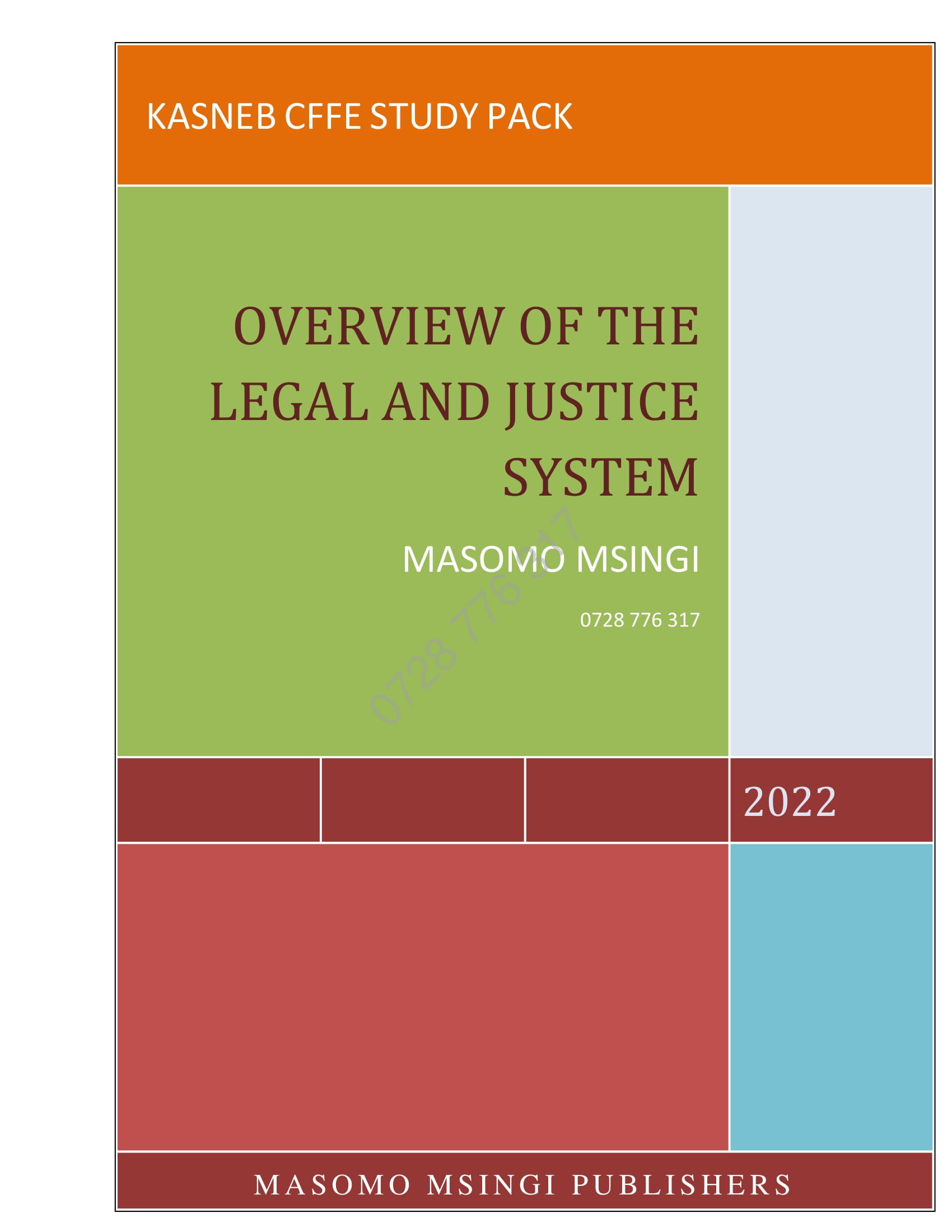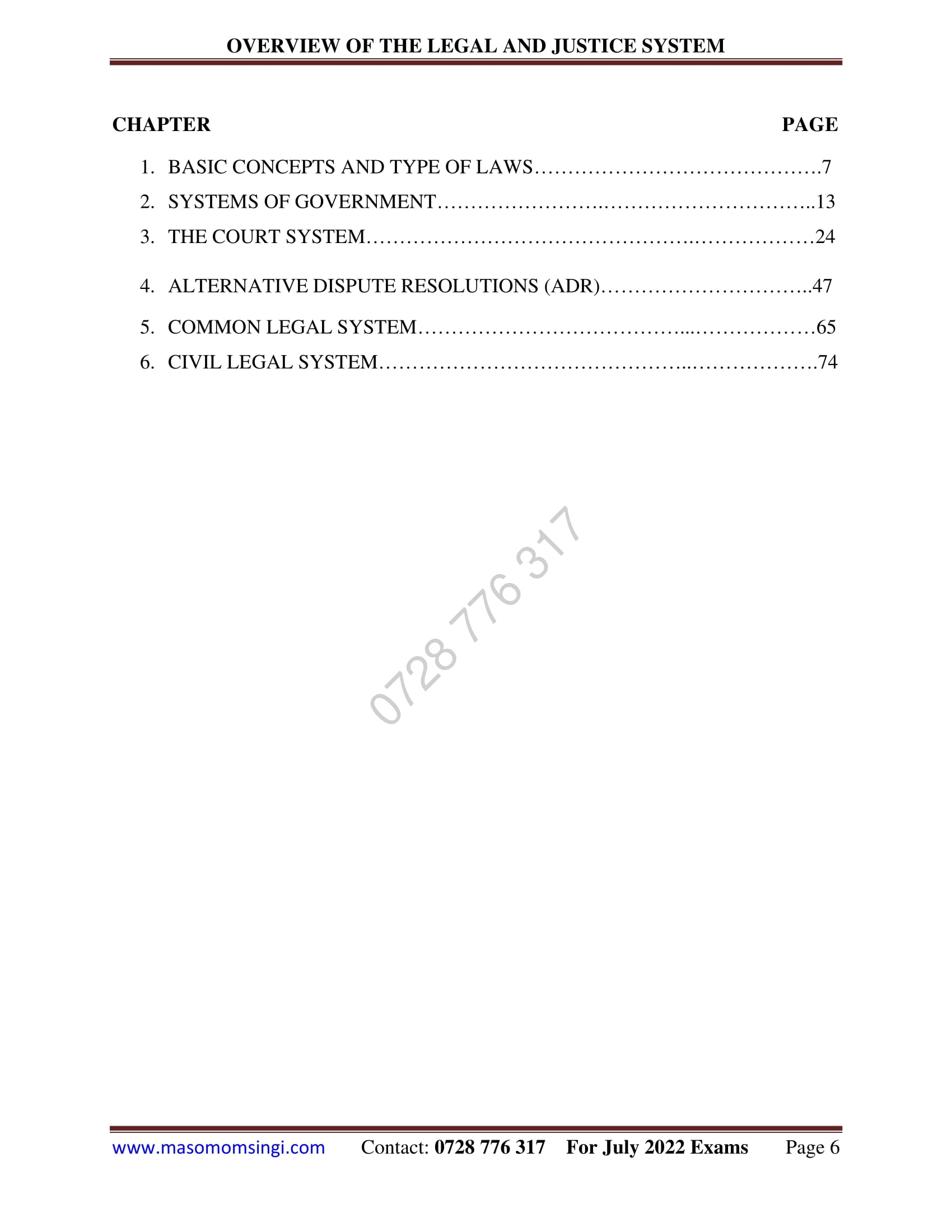MASOMO MSINGI PUBLISHERS APP – Click to download and Access all our materials in PDF

INTRODUCTION
Following our continued effort to provide quality study and revision materials at an affordable price for the private students who study on their own, full time and part time students, we partnered with other team of professionals to make this possible.
.
Special appreciation and recognition to the lecturers who have helped in the development of our materials, These are: FA Kegicha William Momanyi (MBA Accounting, CPA, CISA and CCP), FA Bramwel Omogo (B.sc Actuarial Science, CIFA, CIIA, CFA first level and ICIFA member, Johnmark Mwangi (MSc Finance, CPAK, BCom Finance),CPA Gregory Mailu (Bsc. Economics) CPA Dominic Rasungu and CPA Lawrence Ambunya among others.
SAMPLE WORK
Complete copy of CFFE OVERVIEW OF THE LEGAL AND JUSTICE SYSTEM Study notes is available in SOFT copy (Reading using our MASOMO MSINGI PUBLISHERS APP) and in HARD copy
Phone: 0728 776 317
Email: info@masomomsingi.com
PAPER NO. 3 OVERVIEW OF THE LEGAL AND JUSTICE SYSTEM
UNIT DESCRIPTION
This paper is intended to equip the candidate with knowledge, skills and attitudes that will enable him/her to apply and comply with various laws as they relate to fraud investigations.
LEARNING OUTCOMES
A candidate who passes this paper should be able to:
- Apply the appropriate laws in fraud investigations
- Apply the appropriate judicial process of discovering evidence
- Relate various types of courts and their jurisdiction
- Comply with legal and regulatory requirements
CONTENT
- Basic Concepts and Type of Laws
- Constitutional law
- Statutory law
- Substantive law
- Procedural law
- Administrative law
- Common law
- Civil Law
- Civil and criminal actions of fraud
- Criminal law
- International law
2. Systems of Government
- Unitary system
- Federal system
3. The Court System
- Establishment, structure, composition and jurisdiction of courts
- Supreme Court
- Court of Appeal
- High Court
- Ant-corruption courts
- Employment and Labour Relations Court
- Environmental and Land court
- International Court of Justice
- Magistrates Court
- Court Martial
- Kadhi’s Court
- Distinction between Courts and Tribunals
- Tiered court system
- Jurisdiction and venue
4. Alternative Dispute Resolutions (ADR)
- Nature of alternative dispute resolutions (ADR)
- Nature and types of disputes
- Legal framework governing ADR
- General principles of ADR
- Negation and Conciliation
- Mediation
- Arbitration
- Dispute Review Boards
- Traditional dispute resolution mechanisms
5. Common Legal System
- The common law and substantive law
- The doctrine of stare decisis and case law
- Adversarial judicial process
6. Civil Legal System
- Codified Principles
- Inquisitorial judicial process
- Anti-corruption courts
MASOMO MSINGI PUBLISHERS APP – Click to download and Access all our materials in PDF
CHAPTER ONE
BASIC CONCEPTS AND TYPE OF LAWS
By its nature, fraud examination is a law-intensive field. Legal issues related to fraud are often complex, and their interpretation might require professional legal assistance. CFFEs should always consult with legal advisors if legal questions arise during a fraud examination.
Even with the availability of legal guidance, however, a fraud examiner should be familiar with certain aspects of the law. Often, the success of an investigation hinges on the fraud examiner following the proper legal procedures, whether dealing with a suspect’s rights, collecting documents, or interviewing witnesses.
The structure and substance of the legal system in each jurisdiction can vary significantly, and so legal issues that arise in fraud examinations will also be different from place to place. The materials in the Law section of the Fraud Examiners Manual are designed to explain the common types of legal systems and approaches to fraud-related issues. White-collar crime often crosses jurisdictional borders, and so fraud examiners should be familiar with their home jurisdiction’s legal processes, as well as have a basic understanding of the systems that they might encounter in foreign jurisdictions.
There are different types of law that are determinative to the outcome of legal disputes. The main types include constitutional law, statutory law, common law, administrative law, and international law.
Constitutional law is the body of law established by a sovereignty’s constitution, and it deals with the fundamental principles by which a government exercises its authority.
Constitutions are government charters. They establish and empower the various branches of government, and they set up the rights and obligations of individuals under the government’s jurisdiction.
Statutory law is written law created by a legislature or other governing authority, and it includes statutes and codes passed by the local, regional, or national legislatures (and regulations passed by administrative bodies). In most jurisdictions, criminal law is based on statutes and codes.
The common law consists of the usages and customs of a society as interpreted by the judiciary; it is often referred to as judge-made law. In most common law jurisdictions, civil actions can be based on either statutory or common law.
Administrative law is concerned with the rules and procedures of administrative agencies of government. Administrative agencies have the authority to legislate, adjudicate, and enforce laws within their specific areas of delegated power. Typically, administrative agencies exist in the executive branch and are created and assigned specific tasks by the legislature.
International law is the body of legal rules, regulations, and accepted practices observed by nations, and it defines nations’ legal responsibilities in their conduct with each other and with private individuals and transnational companies. International law is enforced primarily through diplomacy and for reasons of courtesy or expediency.
SAMPLE WORK
Complete copy of CFFE OVERVIEW OF THE LEGAL AND JUSTICE SYSTEM Study notes is available in SOFT copy (Reading using our MASOMO MSINGI PUBLISHERS APP) and in HARD copy
Phone: 0728 776 317
Email: info@masomomsingi.com
Sources of international law include international conventions and treaties, international customs (i.e., international law that derive from custom), general principles of law recognized by the legal systems of civilized nations, the decisions of international and municipal courts, and the publications of scholars.
Substantive and Procedural Law
Law can be categorized as substantive or procedural law.
Substantive law defines the type of conduct permissible and the penalties for violation; it is composed of the basic laws of rights and duties. When people say an act is “against the law,” they are referring to substantive law.
Substantive law can be further subdivided into public and private law. Public law governs the relationship between individuals and the state; it involves such areas as constitutional law, administrative law, and criminal law. Private law encompasses those areas where the legal system is used to resolve disputes between private parties. Examples of private laws are the laws concerning real property, contracts, civil wrongs (e.g., negligence), wills and estates, intellectual property, business organization law, and so on.
Procedural law defines the rules by which individual cases are decided; it sets out the rules of the legal system, including the procedures to be followed in hearing a grievance. Procedural law might include deadlines, filing requirements, steps to follow in bringing a claim, rules of evidence, and so on. Substantive law sets the terms of any dispute; procedural law dictates how a legal dispute is handled.
Despite the wide variety of legal systems—from the power structures of governments to the judicial processes—there are patterns of legal systems in certain countries that makes it easier to evaluate the legal process in each jurisdiction. These patterns arise due to a combination of factors, such as regional ties, former colonial influences, and international initiatives to conform laws to model standards.
Civil and Criminal Actions for Fraud
Fraud may be prosecuted criminally, civilly, or both, in sequence or simultaneously, but there are a number of differences between criminal and civil actions with which CFFEs should be familiar. The following is a brief overview of civil and criminal actions as they relate to fraud.
A criminal action begins with a complaint brought by the government, acting on behalf of citizens and the interest of the jurisdiction, against a person accused of violating a law. Increasingly, most criminal offenses are codified in statutes or regulations.
Typically, to be guilty of a crime, defendants must be found to have committed an offending act (called the actus reus) and to have the requisite culpable mental state when they committed the act (called the mens rea). The actus reus may involve the full act of committing a crime or merely the initial steps for crimes of attempt. Different offenses require different levels of mens rea, such as actual intent, recklessness, or, in some circumstances, no more than gross negligence.
Some criminal offenses, however, are strict liability offenses, which are offenses in which the
government does not have to prove the defendant’s intent.
Criminal cases are punished by outcomes such as imprisonment, fines, orders of restitution, probation, and community service.
A civil action, as opposed to a criminal action, is an action for wrongdoing that does not result in a criminal fine or incarceration. In contrast to criminal actions, which are brought by the government, civil actions may be brought by private individuals or organizations, usually without the involvement or permission of the government or court. However, government entities may also bring civil actions to pursue noncriminal remedies against other parties. Civil actions, if successful, result in an award of civil remedies.
There are a variety of substantive civil causes of action, but the two main causes that fraud examiners are likely to come across are contract actions and civil wrongs (or delicts).
Contract Actions
Contract actions are civil actions based on contract obligations. A contract is an oral or written mutual agreement between two or more individuals or entities that the law will enforce in some way.
Most contract actions are breach of contract lawsuits. A breach of contract occurs when one or both parties fail to perform, or announce that they do not intend to perform, without just cause. If a party breaches, the other party may sue for damages—the loss caused by the other party’s failure to perform—or, in some instances, for specific performance (i.e., an order from the court compelling the defaulting party to perform).
Civil Wrong and Delict Actions
In common law jurisdictions, a civil wrong is a private wrong, such as fraud, that does not arise out of contractual obligations.
In civil law jurisdictions, the equivalent of a civil wrong is often called a delict. A delict is a culpable, wrongful act that causes injuries and results in liability for the person who committed the act.
To successfully bring a civil wrong or delict action, there are generally three requirements:
- A party must owe a duty to another
- The party that owes the duty breaches that
- The breach results in
A person who suffers a civil wrong is entitled to receive compensation for damages from the party responsible for the act.
Parallel proceedings are simultaneous criminal and civil actions against the same defendant that are based upon a single set of facts. For example, a victim of fraud might sue the fraudster in civil court while the fraudster is being prosecuted in criminal court. Some jurisdictions permit parallel proceedings, while others do not.
In jurisdictions that allow parallel proceedings, the government or the defendant can generally petition one of the courts for a stay of proceedings to have a proceeding temporarily suspended.
A court might order a stay of proceedings if it determines that the parallel proceeding would harm the government’s case or unduly prejudice the defendant. However, most courts are reluctant to grant a stay of proceedings under these circumstances.
Administrative Proceedings
In addition to civil and criminal actions, fraud cases are sometimes resolved in administrative proceedings. Administrative proceedings are non-judicial proceedings conducted by government agencies. In some jurisdictions, for example, the government agency responsible for collecting taxes also has the authority to adjudicate certain cases involving tax fraud.


